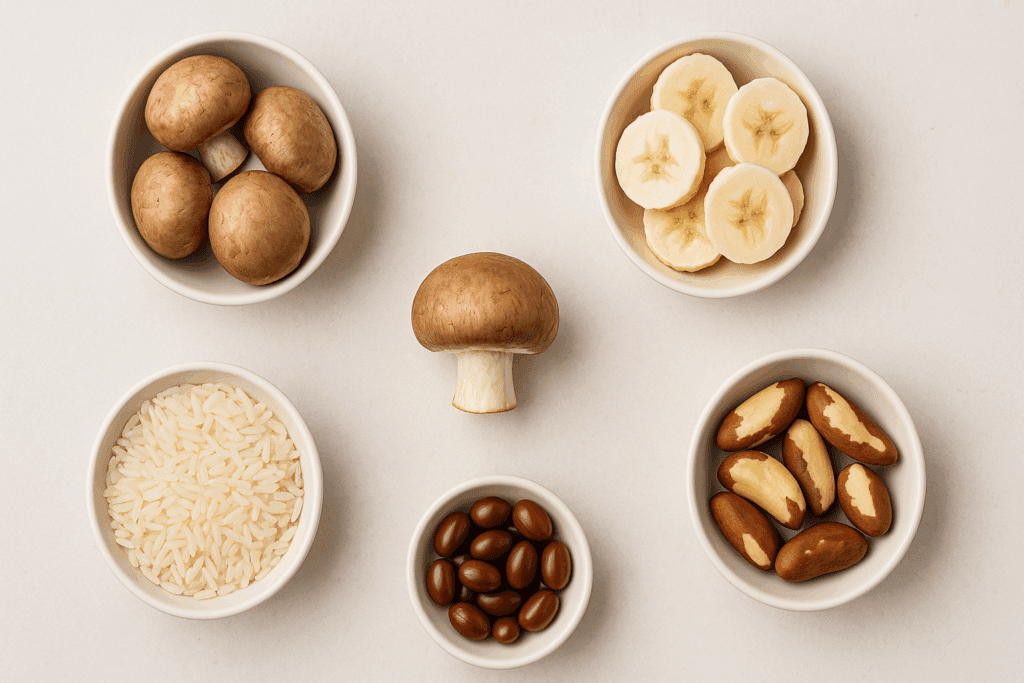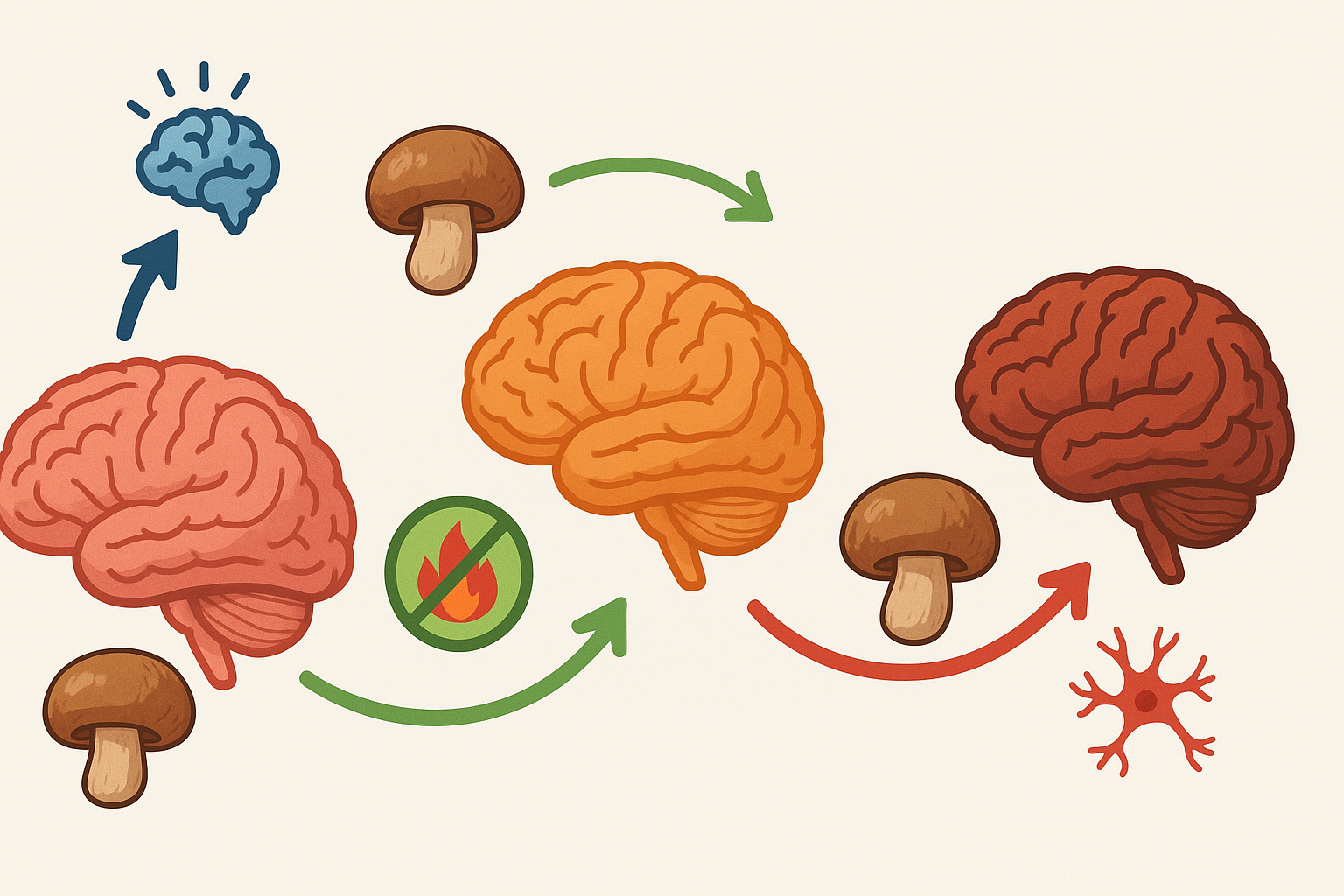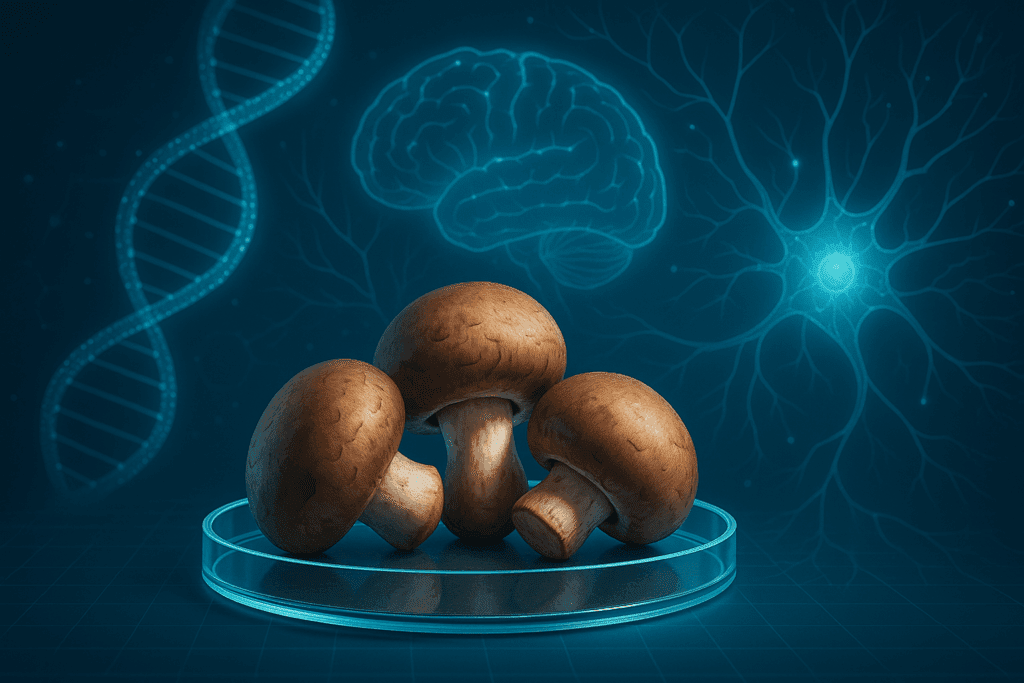Introduction: Unlocking the Brain-Boosting Potential of Crimini Mushrooms
Among the ever-growing list of functional foods and natural nootropics, crimini mushrooms—also known as baby bella or brown mushrooms—have garnered attention not only for their culinary versatility but also for their profound impact on cognitive health. Recent scientific investigations have begun to explore the nutritional value of crimini mushrooms and how their unique compounds interact with neural function, memory retention, and overall brain wellness. For individuals seeking to optimize mental clarity and sustain cognitive vitality, understanding the role these mushrooms play in brain nutrition is essential.
Crimini mushrooms, often overshadowed by flashier superfoods, harbor an impressive profile of micronutrients and antioxidants that contribute directly to neural health. Their role in reducing oxidative stress, promoting neurogenesis, and supporting neurotransmitter balance makes them a compelling addition to any brain-focused diet. As evidence continues to mount in support of diet-based interventions for memory and cognitive enhancement, it becomes increasingly clear that these humble fungi deserve closer examination within the context of nutrition science.
You may also like: The Ultimate Guide to the Best Nootropic Mushrooms for Memory and Cognitive Enhancement

Understanding the Nutritional Value of Crimini Mushrooms
To appreciate the cognitive benefits of crimini mushrooms, one must first understand the depth of their nutritional profile. The nutritional value of crimini mushrooms lies not only in their macronutrient balance but also in the density of brain-supportive micronutrients they deliver. These mushrooms are a low-calorie food, with a typical serving offering only about 20 calories while being rich in water, fiber, and protein. This makes them an excellent option for those managing weight or seeking to reduce their caloric intake without sacrificing nutrient intake.
Crimini mushrooms are particularly high in B vitamins, including riboflavin (B2), niacin (B3), and pantothenic acid (B5), all of which are crucial for energy metabolism in brain cells. Riboflavin helps in the synthesis of flavoproteins involved in redox reactions, while niacin supports cellular repair and neurotransmitter function. Pantothenic acid, on the other hand, is essential for the synthesis of acetylcholine, a neurotransmitter intimately connected to memory formation and learning. In addition to B vitamins, crimini mushrooms are an excellent source of selenium, copper, and potassium—minerals that play a significant role in reducing inflammation, maintaining ionic balance in neurons, and supporting synaptic plasticity.
These mushrooms also provide moderate levels of vitamin D when exposed to sunlight or UV light post-harvest, a factor often overlooked. Vitamin D receptors are found throughout the brain, and deficiencies in this vitamin have been linked to cognitive decline and neurodegenerative diseases such as Alzheimer’s. Including crimini mushrooms in the diet can help improve overall vitamin D intake, especially for individuals with limited sun exposure.

How Crimini Mushrooms Enhance Memory and Cognitive Function
The cognitive benefits of crimini mushrooms stem from their multifaceted effects on brain physiology. One of the most important mechanisms is their antioxidant capacity. Crimini mushrooms are rich in ergothioneine and glutathione, two potent antioxidants that combat oxidative stress in the brain. Oxidative stress is a primary driver of cognitive aging and neurodegeneration, as it damages neuronal membranes, impairs synaptic transmission, and accelerates cellular senescence.
Ergothioneine, in particular, has garnered interest due to its ability to cross the blood-brain barrier and accumulate in areas of high oxidative stress within the brain. Studies suggest that higher levels of ergothioneine are associated with a reduced risk of cognitive impairment in aging populations. Glutathione, another key antioxidant found in crimini mushrooms, supports detoxification processes in the brain and aids in preserving the integrity of neuronal mitochondria.
Moreover, crimini mushrooms contain bioactive compounds such as polysaccharides and phenolic acids that modulate inflammatory pathways. Chronic low-grade inflammation in the brain, also known as neuroinflammation, is now recognized as a central feature of many cognitive disorders. By reducing the expression of pro-inflammatory cytokines, these compounds may help create a more neuroprotective environment, fostering conditions conducive to learning and memory.

The Nutritional Value of Crimini Mushrooms in Nootropic Diets
In the realm of nootropic nutrition, the inclusion of crimini mushrooms presents a compelling strategy for both preventive and performance-enhancing goals. The nutritional value of crimini mushrooms aligns well with the foundational principles of nootropic diets, which emphasize foods that support mental clarity, energy, and emotional resilience. Their low glycemic index and lack of refined sugars ensure stable blood glucose levels, a factor critical for maintaining focus and reducing cognitive fatigue.
Crimini mushrooms also contribute to gut-brain axis health, which is an emerging area of focus in neurocognitive science. Their fiber content acts as a prebiotic, promoting the growth of beneficial gut bacteria that produce short-chain fatty acids (SCFAs) such as butyrate. These SCFAs influence brain function by modulating neurotransmitter synthesis and inflammation. A healthier gut microbiome correlates strongly with better mood regulation, reduced anxiety, and improved cognitive flexibility.
Furthermore, the amino acids in crimini mushrooms support the synthesis of neurotransmitters like serotonin and dopamine. While they are not a complete protein source, the amino acids they do provide can play a role in balancing mood and enhancing mental performance. Including these mushrooms in meals throughout the day can help sustain consistent neurotransmitter levels and avoid the highs and crashes often associated with caffeine-based nootropics.

Are Cremini Mushrooms Good for You? A Functional Perspective
The question “are cremini mushrooms good for you?” can be confidently answered in the affirmative when viewed through the lens of functional medicine and integrative nutrition. Crimini mushrooms are not just good for general health—they are excellent for specific physiological systems, particularly the brain. Their ability to reduce oxidative stress, modulate inflammation, and enhance energy metabolism makes them especially beneficial for individuals seeking cognitive optimization.
Beyond their brain-specific advantages, crimini mushrooms also support liver function, cardiovascular health, and immune resilience. Their selenium content helps regulate thyroid hormones, which play a crucial role in mood and cognition. Additionally, their naturally occurring beta-glucans activate immune cells such as macrophages and natural killer cells, offering systemic benefits that contribute to holistic well-being.
Moreover, crimini mushrooms are free from cholesterol, gluten, and common allergens, making them accessible to a wide range of dietary needs. They are compatible with vegetarian, vegan, paleo, and keto diets, allowing individuals with diverse nutritional philosophies to reap their benefits. Their versatility in cooking further supports consistent inclusion in meals, from breakfast omelets and soups to grain bowls and stir-fries.
While they are safe for most individuals, it’s important to consider sourcing and preparation. Organically grown crimini mushrooms are preferable to reduce exposure to agricultural chemicals. Cooking them lightly enhances their nutrient availability and digestibility, particularly when it comes to polysaccharides and protein absorption. These simple practices ensure that consumers can derive the full spectrum of their functional health benefits.

Nutritional Value of Crimini Mushrooms in Age-Related Cognitive Decline
One of the most promising applications of the nutritional value of crimini mushrooms lies in mitigating age-related cognitive decline. As the global population ages, the burden of neurodegenerative diseases such as Alzheimer’s and Parkinson’s continues to rise. Diet-based interventions represent a low-risk, high-impact strategy for preserving cognitive function into older age. Crimini mushrooms, with their antioxidant and anti-inflammatory properties, offer a naturally protective approach against neural degeneration.
Their high levels of ergothioneine have been studied in relation to age-related memory loss. A 2019 study published in the journal Food Chemistry identified a strong correlation between higher mushroom consumption and reduced odds of mild cognitive impairment in older adults. Researchers hypothesize that ergothioneine may act as a neuroprotectant, preventing damage to white matter and supporting myelination, both of which are essential for efficient communication between brain regions.
In addition, the B vitamins in crimini mushrooms—particularly B2 and B3—play a role in homocysteine regulation. Elevated homocysteine levels are a known risk factor for cognitive decline, as they can damage blood vessels in the brain and promote inflammation. By supporting methylation cycles and DNA repair, these vitamins may help maintain brain plasticity and memory retention in aging populations.
Further, crimini mushrooms offer cognitive support without the adverse effects associated with pharmacological treatments. Unlike many synthetic nootropics, they do not disrupt sleep, induce dependency, or elevate blood pressure. This makes them especially suitable for older individuals who may be managing multiple health conditions simultaneously. Their gentle, cumulative effect on brain function aligns well with the principles of preventive neurology.
Practical Meal Planning with Crimini Mushrooms for Cognitive Gains
One of the most effective ways to leverage the brain benefits of crimini mushrooms is through deliberate meal planning. Integrating them into daily meals in a strategic, thoughtful manner allows their nootropic and nutritional properties to accumulate over time. Whether used as a side dish, primary ingredient, or flavor enhancer, their versatility ensures they can be consumed regularly without culinary fatigue.
For breakfast, pairing crimini mushrooms with omega-3 rich eggs or tofu scramble offers a synergy of nutrients that support synaptic health and neurotransmitter balance. Midday meals can benefit from the addition of sautéed crimini mushrooms in salads, wraps, or grain bowls, especially when combined with avocados or walnuts to boost healthy fats and anti-inflammatory compounds. Dinners featuring mushroom-based stir-fries or soups can promote digestion, support hydration, and deliver a spectrum of nutrients essential for evening mental clarity and restful sleep.
Advanced meal planners might also consider batch-cooking mushroom-rich stews or slow-cooked dishes that preserve their nutritional integrity while enhancing flavor complexity. Freezing mushroom portions for quick reheating allows for consistency in intake even during busy periods. In all applications, using herbs like rosemary, thyme, and turmeric in combination with crimini mushrooms may further enhance neuroprotective effects due to their polyphenol content.

Crimini Mushrooms and Emotional Resilience: A New Frontier
In addition to cognitive enhancement, emerging research points to the potential of crimini mushrooms in supporting emotional resilience and psychological well-being. As mood disorders such as anxiety and depression become increasingly prevalent, the need for dietary strategies that modulate mood-related neurochemistry becomes more urgent. The naturally occurring bioactives in crimini mushrooms, such as ergothioneine, influence pathways that regulate emotional processing and stress adaptation.
Several studies have highlighted the connection between inflammation and mood dysregulation. Because crimini mushrooms help lower pro-inflammatory cytokines, they may play a complementary role in mood stabilization. Furthermore, the presence of B vitamins—especially folate and niacin—contributes to the synthesis of mood-regulating neurotransmitters like serotonin and dopamine. By supporting a well-balanced neurochemical environment, these mushrooms may reduce emotional volatility and improve adaptive coping mechanisms.
The prebiotic fibers in crimini mushrooms also affect the gut-brain axis, a bi-directional communication network that influences emotional health. SCFAs produced by gut bacteria in response to mushroom fiber intake can impact the limbic system, the brain’s emotional center. Over time, a more stable gut microbiome is associated with improved emotional resilience and a lower incidence of anxiety-like behavior.
Incorporating crimini mushrooms into meals aimed at stress reduction—such as warm broths, calming teas, or evening comfort dishes—can promote a sense of calm and well-being. When used as part of a broader lifestyle strategy that includes mindfulness, sleep hygiene, and regular exercise, these mushrooms may serve as a valuable adjunct to emotional wellness routines.

Crimini Mushrooms and the Future of Neurodegenerative Disease Prevention
Looking ahead, the role of crimini mushrooms in preventing or slowing the progression of neurodegenerative diseases is a promising area of ongoing research. The compounds found in these mushrooms interact with several mechanisms implicated in conditions such as Alzheimer’s, Parkinson’s, and vascular dementia. Their neuroprotective antioxidants, anti-inflammatory agents, and metabolic co-factors work in concert to preserve cognitive function at multiple levels.
Animal models have demonstrated that diets enriched with mushrooms, including crimini, can lead to enhanced synaptic plasticity and reduced amyloid-beta plaque accumulation—a hallmark of Alzheimer’s pathology. While more clinical trials are needed, early human studies are beginning to reflect similar patterns, showing lower rates of cognitive decline among those who consume mushrooms regularly.
Moreover, the application of crimini mushrooms in personalized nutrition strategies could become a frontier in integrative neurology. By analyzing individual nutrient deficiencies, genetic predispositions, and lifestyle patterns, healthcare providers may one day tailor mushroom-based dietary protocols to delay or even prevent disease onset. This approach aligns with the growing emphasis on food-based interventions in the management of chronic neurological conditions.
Incorporating crimini mushrooms into brain health protocols—particularly for at-risk populations—offers a low-cost, low-risk, and sustainable strategy. As research continues to validate their efficacy, we may see these humble mushrooms transition from simple culinary ingredients to foundational components of evidence-based neuroprotection.
Incorporating Crimini Mushrooms into a Brain-Healthy Diet
The benefits of crimini mushrooms can only be fully realized when they are consistently incorporated into a balanced, nutrient-dense diet. Their mild, earthy flavor and firm texture make them an ideal complement to a variety of dishes, and their nutrient profile is preserved through simple cooking methods such as sautéing, roasting, or steaming. Including them alongside other brain-friendly foods—like leafy greens, fatty fish, berries, and whole grains—amplifies their nootropic impact.
For those following plant-based or vegetarian diets, crimini mushrooms serve as a critical source of nutrients that are often limited in such eating patterns, such as selenium and vitamin B12 (especially if fortified). They can be used as meat substitutes in burgers, tacos, and pasta sauces, providing both texture and umami flavor while supporting sustainable food choices. Their prebiotic fiber also enhances the absorption of polyphenols from other plant foods, reinforcing their role in a synergistic, brain-nourishing diet.
Meal planning strategies can further enhance their cognitive benefits. For instance, combining crimini mushrooms with eggs and spinach in a breakfast scramble ensures a robust intake of choline, iron, and antioxidants to start the day. Adding them to lentil soups, quinoa bowls, or even homemade veggie pizzas ensures that their nutrients are consumed in diverse, enjoyable forms. Making them a dietary staple rather than an occasional ingredient is key to harnessing their full potential.
Hydration and mindful eating also play a role in optimizing brain function. Crimini mushrooms contain a significant amount of water and contribute to fluid intake, which supports cellular function and neurotransmitter transport. Eating them mindfully—chewing slowly and savoring their texture—may also enhance digestion and nutrient assimilation, which in turn supports more stable cognitive performance throughout the day.
Frequently Asked Questions: The Cognitive Power and Nutritional Value of Crimini Mushrooms
1. How do crimini mushrooms affect focus and concentration in high-stress environments?
Crimini mushrooms may enhance cognitive performance under stress by supporting adrenal function and reducing systemic inflammation. High levels of B vitamins like niacin and pantothenic acid help regulate cortisol, the hormone responsible for stress response, while also fueling mitochondrial function in brain cells. This dual action aids in maintaining mental clarity and reducing cognitive fatigue during extended periods of stress. The presence of antioxidants like ergothioneine adds further resilience against oxidative damage triggered by chronic tension. Integrating crimini mushrooms into meals before or after high-stress activities can offer nutritional support for sustained focus and reduced burnout.
2. What are the lesser-known bioactive compounds in crimini mushrooms that benefit brain health?
Beyond the well-recognized antioxidants, crimini mushrooms also contain unique compounds such as hericenones and erinacines, typically associated with lion’s mane mushrooms but found in trace amounts here. These compounds have shown potential in supporting nerve growth factor (NGF) synthesis, which is essential for maintaining neuronal structure and function. While more concentrated in other fungi, the trace presence in crimini mushrooms hints at broader neurotrophic potential when consumed regularly. In addition, their phenolic acids contribute to cell signaling modulation, which plays a role in synaptic function and cognitive processing. These lesser-known agents suggest that crimini mushrooms may provide more diverse brain-supportive compounds than previously assumed.
3. How does cooking method influence the nutritional value of crimini mushrooms?
The nutritional value of crimini mushrooms can be preserved or diminished depending on cooking methods. For example, sautéing at moderate heat with a small amount of healthy fat like olive oil helps preserve antioxidant compounds and improves the absorption of fat-soluble nutrients. In contrast, boiling may lead to the leaching of water-soluble B vitamins and minerals into the cooking water. Roasting can concentrate flavors and maintain nutrient density if done without excessive charring. Moreover, pairing cooked crimini mushrooms with vitamin C-rich foods like bell peppers may enhance iron absorption, offering a simple culinary hack to boost their nutritional efficacy.
4. Can crimini mushrooms support brain development during early life stages?
Yes, crimini mushrooms may support neural development during infancy, childhood, and adolescence when introduced appropriately as part of a balanced diet. Their B vitamin content plays a foundational role in myelination, the process that ensures efficient nerve transmission across the developing brain. In particular, riboflavin and folate are crucial during pregnancy and early childhood to prevent neural tube defects and support DNA synthesis. Though not commonly associated with early-life nutrition, incorporating small amounts into purees or family meals can provide developmental support. Importantly, they are a safe, natural food that aligns with pediatric nutritional guidelines when properly cooked and introduced.
5. How do crimini mushrooms impact hormonal balance that indirectly affects brain health?
Hormonal fluctuations significantly affect mood, cognition, and mental stamina, and crimini mushrooms may offer support by helping balance endocrine function. The selenium found in these mushrooms contributes to healthy thyroid regulation, a critical factor in mood stability and cognitive energy. Additionally, their contribution to adrenal health through pantothenic acid supports hormone synthesis and stress modulation. Balanced hormones can reduce mood swings and promote steady emotional processing, especially during menopause or high hormonal transition periods. Including crimini mushrooms in meals throughout the hormonal cycle may offer dietary support for more stable cognitive-emotional regulation.
6. What is the relationship between gut health and the nutritional value of crimini mushrooms?
The nutritional value of crimini mushrooms extends to their impact on the gut microbiome, a central player in the gut-brain axis. The prebiotic fibers in these mushrooms nourish beneficial bacteria like Bifidobacteria and Lactobacillus, which in turn produce neurotransmitter precursors such as GABA and serotonin. A healthier gut environment enhances mood, memory consolidation, and emotional processing, revealing a critical link between digestion and brain health. Regular consumption may reduce bloating, improve nutrient absorption, and establish a more favorable microbiota profile that supports mental well-being. This dual action reinforces crimini mushrooms as both a digestive aid and nootropic food.
7. Are cremini mushrooms good for you if you’re dealing with anxiety or depression?
Indeed, the question “are cremini mushrooms good for you?” becomes particularly relevant for individuals managing anxiety or depression. These mushrooms contain compounds that reduce pro-inflammatory cytokines—agents increasingly linked with mood disorders and cognitive dysfunction. Additionally, the presence of selenium, niacin, and potassium contributes to more balanced neurotransmission and cellular hydration, both vital for mental health. The anti-inflammatory properties may mitigate neural inflammation often found in those with depression, while stable nutrient intake supports energy and emotional regulation. Crimini mushrooms can act as part of a broader dietary strategy that prioritizes brain health and emotional balance.
8. How does the nutritional value of crimini mushrooms differ from other mushrooms commonly used in nootropic diets?
While lion’s mane and reishi are often spotlighted in nootropic circles, the nutritional value of crimini mushrooms presents a unique blend of accessibility and potency. Unlike specialty mushrooms, crimini mushrooms are widely available and contain significant levels of B vitamins, selenium, and ergothioneine—components often lacking in more exotic fungi. They also offer better culinary versatility, making daily inclusion more feasible, which amplifies their cumulative benefits. Compared to white button mushrooms, crimini varieties offer higher antioxidant concentrations and deeper umami flavor, enhancing both nutrient density and palatability. This balance makes them a practical and effective option for long-term cognitive wellness.
9. Can crimini mushrooms be used to enhance post-workout cognitive recovery?
Yes, incorporating crimini mushrooms into post-exercise meals may accelerate both physical and cognitive recovery. Intense exercise can lead to oxidative stress and temporary mental fatigue, conditions counteracted by the antioxidants in crimini mushrooms. The potassium content helps replenish electrolytes, while the B vitamins aid in cellular energy regeneration essential for brain and body recovery. Moreover, their anti-inflammatory properties may assist in reducing neuroinflammation caused by exertion. Consuming them alongside protein-rich foods such as lentils or lean meats can maximize their contribution to post-workout brain and body replenishment.
10. What future research directions are emerging around the nutritional value of crimini mushrooms?
As interest in functional foods expands, the nutritional value of crimini mushrooms is attracting attention from neuroscientists and nutritionists alike. Ongoing studies are examining how consistent intake influences gene expression related to cognitive aging and neuroplasticity. Researchers are also exploring their potential role in epigenetic modulation, particularly how compounds like ergothioneine interact with DNA methylation pathways. Innovations in mushroom cultivation may soon allow for biofortified crimini varieties with enhanced nootropic effects. These directions hint at a future where crimini mushrooms are not just dietary supplements, but strategic tools in personalized brain health programs.
Conclusion: Elevating Brain Health Through the Nutritional Value of Crimini Mushrooms
In a world increasingly focused on brain longevity and mental performance, the role of food as medicine has never been more critical. The surprising cognitive benefits and nutritional value of crimini mushrooms position them as a uniquely powerful tool in the arsenal of memory and cognitive enhancement strategies. Their rich supply of B vitamins, antioxidants, and trace minerals supports nearly every dimension of brain health—from mood regulation and memory formation to neuroprotection and metabolic efficiency.
Repeatedly, the question “are cremini mushrooms good for you?” finds strong affirmation in both scientific literature and dietary practice. Their contributions to oxidative stress reduction, neurotransmitter balance, and gut-brain communication underscore their relevance in modern cognitive nutrition. As functional foods continue to gain recognition in integrative health, crimini mushrooms stand out as an accessible, affordable, and evidence-backed option for those seeking to safeguard their mental sharpness.
The continued exploration of their benefits in aging populations, nootropic diets, and even in the context of neurodegenerative disease prevention holds great promise. While no single food can act as a panacea for cognitive health, the consistent inclusion of crimini mushrooms within a balanced and mindful eating pattern offers measurable advantages. With a growing body of evidence supporting their efficacy, now is the time to recognize these humble mushrooms for the brain-boosting superstars they truly are.
As we move toward a more holistic understanding of nutrition’s role in brain health, embracing foods like crimini mushrooms reflects not only scientific wisdom but also culinary joy. In each tender bite lies the potential for sharper thinking, enhanced memory, and a future where cognitive decline is met not with resignation, but with proactive nourishment.
Further Reading :
Cremini mushroom Glycemic Index, Nutrition Facts
Cremini Mushrooms Benefit the Heart, Gut & Help Fight Against Cancer
Crash Course: Everything You Need to Know About Cremini Mushrooms
